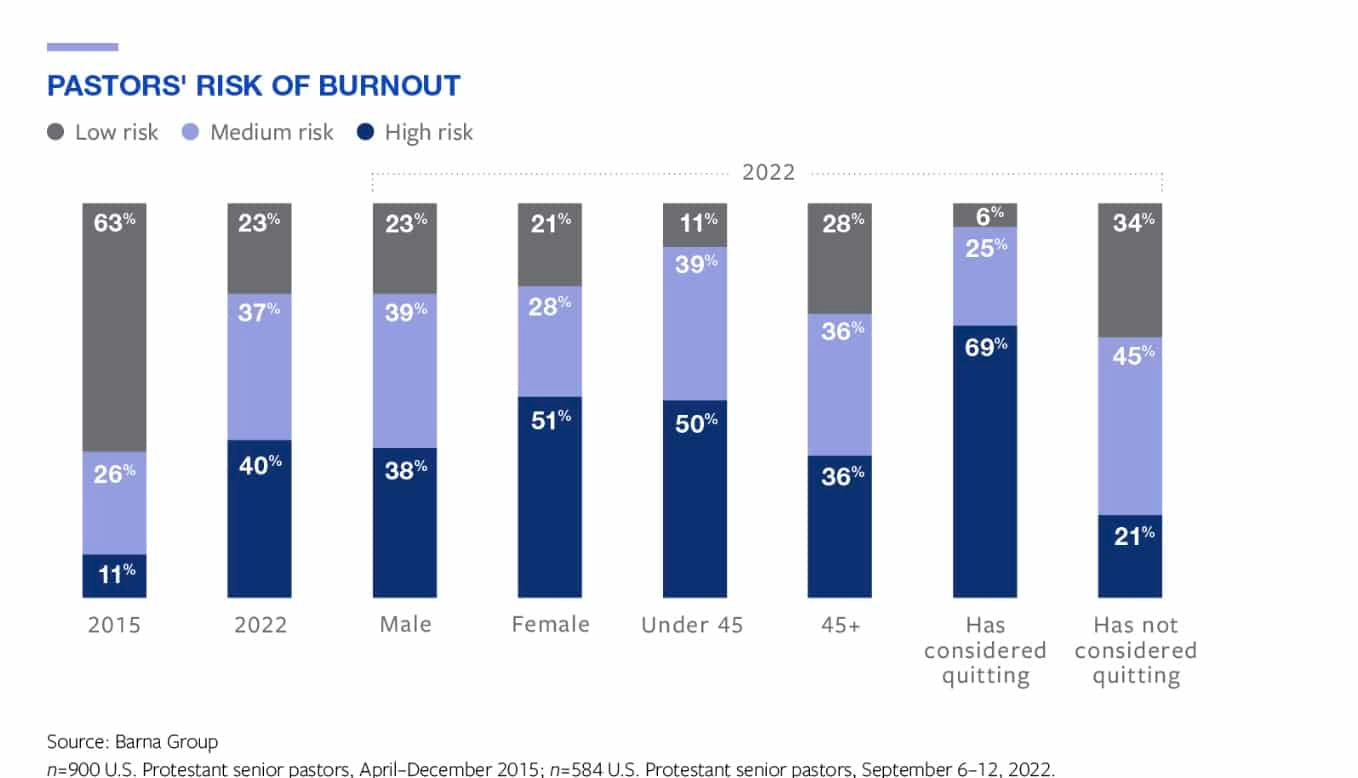We all know and love our pastors. They carry the weight of guiding their flocks through life’s twists and turns. But who guides them? These amazing leaders need to be supported in the same way they support us. Nurturing pastoral mental health is vital for the strength of any church.
This podcast dives into 10 simple yet powerful tips to support pastoral mental health. It’s a conversation starter—a reminder that pastors, just like anyone else, face challenges that can leave them weary. We’ll explore breaking the silence around mental health, setting boundaries, and fostering a culture of understanding.
From self-care routines to the importance of strong support systems, these tips are a beacon of light for pastors navigating the often demanding terrain of ministry. Let’s embark on a journey to ensure that those who tirelessly nurture the spiritual health of others find the support and resilience they need for their own well-being.
Estimated reading time: 10 minutes
Table of contents
10 Tips for Pastoral Mental Health

Here are our top 10 tips for addressing and handling the mental health of your pastors. These people work long hours caring for the needs of the church and the congregation, and they deserve to be supported in the same way.
Some of these tips are for pastors themselves so they can better take care of themselves. Other tips are for the rest of the church community so that they can better support their pastors.
We encourage you to implement these tips in order to best care for your leaders.
Let’s jump in.
1. Self-Awareness for Pastors
Firstly, we have something pastors can start to work on in order to take care of themselves. Pastoral self-awareness is the cornerstone of a resilient and effective ministry. It involves pastors taking a close look at their own thoughts, feelings, and overall well-being.
By recognizing and acknowledging their mental and emotional states, pastors can better navigate the challenges of their roles. This self-awareness extends to understanding personal strengths and limitations. It’s a simple yet powerful tool for preventing burnout and maintaining a balanced life.
According to Barna Group, in 2022, 40% of pastors were at a high risk to experience burnout, and another 37% were at a medium risk to experience burnout.

Avoiding burnout requires self-awareness and healthy boundaries. A pastor needs to be aware of their limits and how much energy they are using up versus the energy they’re gaining.
Pastors who prioritize self-awareness are better equipped to serve their congregations with authenticity and empathy. When they are aware of their strengths, weaknesses, limits, and boundaries, they can live a happy and healthy life.
2. Pastoral Counseling
Professional counseling plays a crucial role in supporting pastors facing mental health problems. Just as they guide their congregations, pastors, too, benefit from mental health services provided by trained mental health professionals. Seeking mental health treatment is not a sign of weakness but a proactive step towards well-being.
Pastoral counselors offer pastors a safe space to address the unique challenges they encounter in their roles. These services focus on understanding and managing mental health problems, ensuring pastors can navigate their responsibilities with resilience.
Even today, spiritual leaders like pastors seeking help in a clinical setting can be sort of taboo. Christians may also consider it as seeking help from human practices instead of from God. But professional counseling is not meant to replace God or spiritual disciplines, it is simply meant to partner with them to increase the mental health of your pastor.
By embracing professional counseling, pastors contribute to creating a healthier, more sustainable approach to ministry. It’s a resource that fosters self-awareness, equipping pastors with the tools they need to serve their communities while maintaining their own mental and emotional health.
3. Establishing Support Networks
Thirdly, pastors can enhance their well-being by establishing support networks that recognize warning signs and address increased risk factors. Creating these networks involves connecting with peers, mentors, and mental health professionals who can offer support when needed.
By fostering relationships within these networks, pastors can share concerns and receive guidance, minimizing the impact of potential warning signs. Increased risk factors, such as stress or burnout, can be effectively managed through the support and understanding of these connections.
It’s a practical strategy that not only helps pastors navigate challenges but also provides a safety net for early intervention.
In essence, establishing support networks is a proactive approach to mitigating risks, offering pastors the strength and resilience they need to navigate the demands of their roles successfully. It’s up to them to reach out and make these connections, and it’s up to these trusted individuals to support the pastor in their duty.
4. Prioritizing Self-Care

Prioritizing self-care is foundational for pastors, integrating both clinical practice and a spiritual perspective. Self-care involves intentional practices that maintain mental and emotional well-being, ensuring pastors can fulfill their roles effectively.
From regular exercise to adequate rest, these self-care routines contribute to a holistic approach that addresses both physical and spiritual needs. Pastors can view self-care not only as a personal practice but as a vital aspect of their therapeutic relationship with themselves.
By recognizing the interconnectedness of physical and spiritual health, pastors can establish a sustainable balance in their lives. This approach enhances their ability to engage in clinical practice – providing support to others while also fostering personal resilience.
In essence, prioritizing self-care is not just a personal choice; it’s a fundamental aspect of maintaining a healthy and effective life.
5. Work-Life Balance
Work-life balance is key for pastors to navigate the demands of their roles effectively. It involves finding a sustainable equilibrium between professional responsibilities and personal life. Pastors can achieve balance by setting clear boundaries. This involves designating specific times for work and personal activities.
This approach ensures that the rigors of ministry don’t overshadow essential aspects of personal well-being. Prioritizing family time, leisure, and rest contributes to a healthier work-life balance. By recognizing the importance of both professional and personal spheres, pastors can cultivate resilience and prevent burnout.
Work-life balance is not just a luxury but a practical necessity for sustaining long-term effectiveness in ministry. By intentionally managing their time and commitments, pastors create a harmonious rhythm that promotes overall well-being and enhances their ability to serve their congregations with dedication and authenticity.
6. Set Up Healthy Boundaries
Setting up healthy boundaries is crucial for pastors to maintain balance in their lives and ministries. It involves clearly defining limits on time, energy, and commitments to prevent overwhelm and burnout.
Pastors can establish these boundaries by prioritizing self-care, learning to say ‘no’ when necessary, and communicating realistic expectations with church members. By acknowledging personal limits, pastors create space for rest, reflection, and personal well-being. Healthy boundaries not only protect pastors from the pressures of an often demanding role but also contribute to sustained effectiveness and authenticity in their pastoral duties.
We recommend Cloud and Townsend’s Boundaries book series, which has a bible-centered view on creating healthy boundaries in life. Their book Boundaries for Leaders is especially helpful to church leaders like pastors.
Essentially, setting up healthy boundaries is a practical and essential step for pastors to navigate their responsibilities with resilience and ensure a fulfilling and sustainable ministry.
7. Sabatticals for Pastors

Sabbaticals for pastors are vital periods of extended rest and rejuvenation. These breaks allow pastors to step away from their regular duties, providing dedicated time for reflection, spiritual renewal, and personal rest.
Sabbaticals are not vacations but intentional pauses in ministry, allowing pastors to recharge their emotional and physical reserves. During this time, pastors can engage in self-care, pursue further education, and deepen their spiritual connection.
Sabbaticals play a crucial role in preventing burnout, enhancing overall well-being, and ensuring long-term effectiveness in pastoral roles. By embracing these intentional breaks, pastors invest in their own sustainability and contribute to the longevity and vibrancy of their ministry.
Sabbaticals are a practical strategy for pastors to maintain a healthy balance and longevity in their pastoral journey.
8. Involve Spouses and Families
Involving spouses and families is integral to supporting pastors in their roles. By recognizing the impact of pastoral duties on family life, congregations can contribute to a healthier work-life balance. Practical strategies for involving spouses and families include:
- Facilitating open communication to address the challenges faced by families.
- Providing resources and support networks specifically designed for spouses.
- Acknowledging the importance of family time and encouraging pastors to prioritize it.
- Offering educational programs that help families navigate the unique dynamics of pastoral life.
When spouses and families are actively involved, pastors can experience a more comprehensive support system. This therefore enhances their overall well-being and effectiveness in ministry. It’s a collaborative effort that fosters a sense of community and shared responsibility, ensuring the pastor’s personal life aligns with their pastoral responsibilities.
9. Financial Wellness
Financial wellness is an important and often overlooked aspect of a pastor’s overall well-being. It involves managing finances in a way that ensures stability and minimizes stress. Congregations can support pastors by offering resources and programs that address financial challenges.
From budgeting workshops to financial counseling, these initiatives empower pastors to navigate their financial responsibilities with confidence. Providing fair and competitive compensation packages is essential, recognizing the dedication and hard work pastors invest in their roles.
By fostering financial wellness, congregations contribute to a pastor’s peace of mind. This allows them to focus on their ministry without the added burden of financial stress.
Financial wellness is an integral part of supporting pastors holistically, ensuring they can fulfill their calling with dedication and financial stability.
10. Celebrate Achievements
Celebrating achievements is a fundamental practice in sustaining pastoral well-being. Recognizing and acknowledging milestones, both big and small, fosters a positive and motivating environment within congregations. Here’s how celebrating achievements contributes to pastoral support:
Firstly, acknowledgment reinforces the value of a pastor’s efforts, validating their dedication to the congregation and community. When achievements are celebrated, pastors feel a sense of accomplishment and purpose in their roles.
Secondly, celebrating achievements creates a culture of appreciation within the congregation. It encourages congregants to actively recognize and express gratitude for the positive impact their pastor has on their lives.
Moreover, celebrating achievements is an opportunity for congregational leaders to publicly commend pastors for their hard work and commitment. This public acknowledgment contributes to a pastor’s sense of fulfillment and reinforces their significance in the community.
In essence, celebrating achievements is more than just acknowledging accomplishments; it is a communal expression of gratitude, support, and encouragement. By actively recognizing and celebrating the achievements of pastors, congregations contribute to a positive and uplifting environment, ensuring pastors feel valued, motivated, and inspired in their ongoing ministry.
Addressing Pastoral Mental Health Issues

And there you have it! The well-being of pastors is a thread that weaves strength into the entire congregation. As we conclude this exploration of pastoral mental health, remember that simple changes can make a big impact.
Encourage open conversations, embrace self-care, and let compassion be the compass guiding your community. By prioritizing the mental health of those who guide and uplift, you can build a foundation of resilience and understanding.
The journey towards a healthier, more supportive environment for pastors is ongoing, but it begins with recognizing the importance of their well-being. As you and your church community implement these 10 tips, we pray that they develop a more healthy environment for your church. That it becomes a place where pastors can find solace, strength, and the support they need to continue shepherding with grace and joy.
God bless.
Further Resources for Pastors





